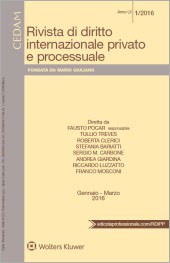Rivista di diritto internazionale privato e processuale (RDIPP) No 3/2020: Abstracts
 The third issue of 2020 of the Rivista di diritto internazionale privato e processuale (RDIPP, published by CEDAM) was just released. It features:
The third issue of 2020 of the Rivista di diritto internazionale privato e processuale (RDIPP, published by CEDAM) was just released. It features:
Ilaria Viarengo, Professor at the University of Milan, Planning Cross-Border Successions: The Professio Juris in the Succession Regulation (in English)
- This article addresses the role of party autonomy in Regulation (EU) No 650/2012 in the context of estate planning, Against this backdrop, the interface between the law governing the succession and property aspects of marriage or of a registered partnership, as provided in the Regulations (EU) No 2016/1103 and 2016/1104, is also analysed. This article also proceeds to examine the optio juris functioning and, in particular, it focuses on, respectively, the object of the choice, the determination of the nationality, whose law may be chosen, and the formal and substantial validity of the agreement. Finally, the protection of close family members in connection with the freedom of choice is taken into account, as the choice of law could be in contrast with the legitimate expectations of family members on the applicability of certain provisions on forced heirship and lead to a law that actually undermines their position.
The following comment is also featured:
Edoardo Benvenuti, PhD Candidate at the University of Milan, La tutela collettiva risarcitoria dei consumatori nelle controversie transfrontaliere: diritto interno e prospettive di armonizzazione (‘Cross-Border Consumer Collective Redress: Domestic Law and Prospects for Harmonisation’; in Italian)
- This article examines some developments in the area of consumer collective redress in the EU, especially in the light of the recent proposal for a Directive on representative actions. In Italy, Law No 31 of 12 April 2019 introduces a new type of class action which triggers some reflections and, in particular, doubts about its congruence with the Directive. The Author examines whether the principles set forth in the proposed Directive are consistent with the protection of consumer collective interests and whether, in matters with cross-border implications, Regulation (EU) No 1215/2012 is an efficient instrument. Even though some CJEU decisions seem to promote a flexible interpretation of this latter Regulation, its provisions do not encompass collective redress; therefore, a reform is desirable.
In addition to the foregoing, this issue features the following book review by Francesca C. Villata, Professor at the University of Milan: Chris Brummer (ed.), Cryptoassets: Legal, Regulatory and Monetary Perspectives, Oxford University Press, New York, 2019, pp. XIII-441.


